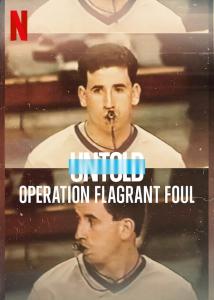
“Operation Flagrant Foul“, the latest installment in Netflix’s series Untold, is a tricky one to think through. It is also yet another sports story that apparently everyone in the world knew about and I missed completely. So, you know, it was ‘untold’ as far as I was concerned, while I’m sure all of you already know the details.
If you don’t: NBA referee Tim Donaghy (no relation to Jack Donaghy) was paid a pittance ($2,000/game) to predict who would win to his friend Tommy. Tommy’s bookie Jimmy would then bet on those games and make a ton of money (for himself–Donaghy claims not to have gotten more than the $2,000/game, and either it wasn’t clear or I just don’t remember how much Tommy made). After 47 predictions (37 of which were winners, which works out to $74,000 for Donaghy if my math is right–there was no cost and no penalty for getting one wrong), the FBI arrested the lot of them and they all spent some time in prison.
My vague impression is that most of these details were publicly available at the time (and as in the past: I’m no sports guy, so take that for what it’s worth). What this episode brings to the table is Donaghy’s specific claims for his own innocence. He makes two arguments:
- The bookie threatened his family if he didn’t cooperate.
- The NBA itself was corrupt, and he was just calling things they way he understood that they wanted him to. That he knew how it would affect the games was perhaps technically inside knowledge, but it was knowledge that any clever observe probably could have figured out on their own anyway.
The first of these is less interesting, if more dramatic, and is basically a he said/he said situation. Either threats were made or they weren’t, and as no one else was in the room only Jimmy and Donaghy know.
The second of these is more interesting–to the point where the wife and I spent a good deal of time trying to figure out what we thought. On the one hand, Donaghy claimed that he never threw a call, always called it like he saw it, and had gotten where he was by calling things the way the NBA wanted him to call things. He argued that there was subtle pressure in the NBA to keep the games entertaining so that they would keep viewers and keep making money. So no foul calls on major stars–he talks about calling Jordan and then getting in trouble for calling a foul on Jordan, because fans don’t go to watch the Bulls only to see Jordan foul out and sit on the bench. He also suggests that the league wants to see the championship go to seven games, and if the refs can help out with that it would be great.
I think that one is tricky. It may very well be that the NBA likes seeing the championship go to seven games, but never explicitly says so, but the refs who know what the NBA really wants are the ones who end up at the top of the pile and are the ones picked to call the games. Or maybe it’s all on the up-and-up and Donaghy really was the only one calling things differently. Or maybe he wasn’t calling things incorrectly at all and the NBA is honest and the only real problem was his gambling–which he also claimed everyone did (though more in the ‘go to the casino and hit the slots’ area of gambling than in the ‘betting on games I’m the referee for’ type of gambling). This is tricky, and no doubt it’s because we live in a fallen world where there is cheating and lying, such that at times we can’t even tell when cheating and lying is happening. Or we can, but we can’t tell who’s doing the cheating and lying.
On the other hand, Donaghy also claimed that he wasn’t throwing games, he just knew what was going on in the NBA and could predict accordingly. What’s more, the examples he provides (and of course he’s a biased source, so we should take that for what it’s worth) are the sorts of things that a careful observer of the sport could have figured out on his own. At one point he tells his friend how to bet based on an altercation between a player and a referee in a previous game that had created a grudge which, Donaghy predicted, would affect how that ref called things and possibly affect the outcome of the game. In another instance he knew that the NBA had announced it was going to crack down on palming the ball (I think that was the phrase) and that there was one player who did that all the time (LeBron? I think?), so he told his friend to bet against that player’s team in the next game. Again, there’s nothing here that someone paying attention couldn’t decide on their own, and while it is against NBA rules for a referee to be betting at all that’s not quite the same thing as saying he’s corrupting the sport and throwing the games.
Obviously, this could all be a lie. Or it could be true, but only the explanation for some of the games and not for the ones that Donaghy threw. Or he could think it is true but have been subconsciously changing his calls. Or, well, again, we don’t know. Yet again, we have a reminder that we live in a fallen world and that we should be cautious about giving our trust and support unreservedly to anyone–even the powers who are responsible for enforcing the rules. While I am generally team “establishment” (though I have no particular attachment to the NBA), we should never be fully or totally dedicated to existing structures. They are better than having no structures, but they are also part of a fallen world. And this particular episode is a great way to see a very banal example of sin in action.
It’s also a lot of fun to watch. So there’s that too.
Dr. Coyle Neal is co-host of the City of Man Podcast an Amazon Associate (which is linked in this blog), and an Associate Professor of Political Science at Southwest Baptist University in Bolivar, MO













